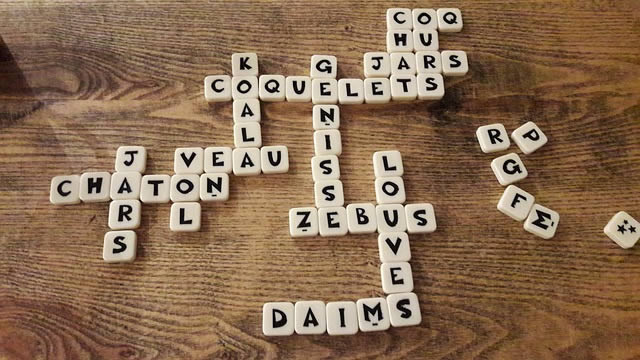12of the most Common errors in French
Saturday March 29, 2025 | French Language | Posted by French Abroad
While the French language is beautiful and romantic, sometimes it is downright perplexing for those brave souls attempting to master it while studying French. Let’s dive into the delightful world of French faux pas and linguistic mishaps that leave native speakers either giggling or gasping. Here are 12 of the most common errors in French!
Is French difficult to learn?
Before diving into these ‘fun errors’, let‘s first see if French is considered a difficult language to learn? In general, French is considered moderately challenging to learn, especially for English speakers, because French is some unique difficulties that set it apart from both English ánd Spanish.
The French language is more complex than, for example English due to:
- Gendered nouns. Every noun in French has a gender. It’s either masculin or feminin. And unfortunately, you have to learn them to avoid French grammar mistakes.
- More intricate verb conjugations (compared to English)
- Unique pronunciation rules e.g. the word pays has two syllables. Lots of beginners pronounce the word ‘pays’ as “pay” in English. This is a mistake. Pays has two syllables and is pronounced “pay-ee”.
- Complex grammatical structures including prepositions usage. Especially, the French prepositions of place can be quite complex in the beginning. Like in: J’habite en France et je reste au Portugal = I live in France and I stay in Portugal.
Some of those specific learning challenges are similar for, for example, Spanish ((the gendered nouns, the multiple verb tenses) (read more below 1) and 3)).

Key Challenges in Learning French
• First of all, there are the “pronunciation hurdles” for those learning French. French it not easy to pronounce due to:
- Unique sounds like nasalized vowels
- Silent letters
- Guttural “R” pronunciation
- Complex phonetic rules
• Secondly, there are some tricky grammar issues:
- French is a gender-based language: Every noun has a gender, and it’s not always logical. On top of that, the gendered nouns affect the adjectives.
- Again: the silent letters: French is notorious for letters you see but don’t pronounce.
- Complex verb conjugations: With multiple tenses and irregular verbs, it’s a conjugation jungle. French has 15 verb tenses with 4 rarely used.
- False friends: Words that look familiar but mean something entirely different.
Some examples of False friends in French:
- Actuellement = currently (and not actually = en fait)
- Car = because (and not a car = une voiture)
- La figure = the face (and not the figure = un chiffre)
- Formal vs. informal language distinctions.
Nationality-Specific Struggles when learning French
Some nationalities struggle more with French than others. Different language backgrounds lead to unique challenges:
- English speakers often struggle with gendered nouns and pronunciation.
- Spanish speakers might overuse subjunctive tenses.
- Chinese speakers may find French articles and verb conjugations particularly challenging.
People that speak a language that is more distant from French linguistically tend to pose greater challenges while people living in countries with greater exposure to French media and culture may have an advantage. For instance, countries that dub foreign content into their native language, like France does, may struggle more with learning other languages compared to those that use subtitles while watching movies.
Some cultures may have more positive or negative attitudes towards learning French, which can impact motivation and success in language acquisition. Finally, people from countries with a strong multilingual tradition may find it easier to learn additional languages like French.

The Hall of Fame: 12 Hilarious French Mistakes
Beginner Blunders
1. “Je suis chaud(e)”
Intended: “I’m hot” (temperature)
Actual meaning: “I’m horny”
Correct phrase: “J’ai chaud”
2. “Je suis plein(e)”
Intended: “I’m full” (after eating)
Actual meaning: “I’m pregnant” (for women)
Correct phrase: “Je n’ai plus faim”
3. “Je vais aller à la librairie pour acheter un livre”
Intended: “I’m going to the library to buy a book”
Actual meaning: “I’m going to the bookstore to buy a book”
Correct phrase: “Je vais aller à la bibliothèque pour emprunter un livre”
4. “J’ai baisé ma grand-mère”
Intended: “I kissed my grandmother”
Actual meaning: “I had sex with my grandmother”
Correct phrase: “J’ai embrassé ma grand-mère”
Intermediate Muddles
5. “Je suis excité(e) de te voir”
Intended: “I’m excited to see you”
Actual meaning: “I’m sexually aroused to see you”
Correct phrase: “J’ai hâte de te voir”
6. “J’ai attendu la conférence hier soir”
Intended: “I attended the conference last night”
Actual meaning: “I waited for the conference last night”
Correct phrase: “J’ai assisté à la conférence hier soir”
7. “Je veux un préservatif pour mon sandwich”
Intended: “I want a preservative for my sandwich”
Actual meaning: “I want a condom for my sandwich”
Correct phrase: “Je veux un conservateur pour mon sandwich”
8. “Ta chatte est très mignonne”
Intended: “Your cat is very cute”
Actual meaning: “Your pussy is very cute” (vulgar)
Correct phrase: “Ton chat est très mignon”

Advanced Awkwardness
9. “Je suis le poisson que tu vas baiser”
Intended: “I am the next one you’re going to kiss”
Actual meaning: “I am the fish you’re going to f***”
Correct phrase: “Je suis le prochain que tu vas embrasser”
10. “Avant d’aller dormir, je me touche et je touche mon fils”
Intended: “Before going to bed, I shower and bathe my son”
Actual meaning: “Before going to bed, I touch myself and touch my son”
Correct phrase: “Avant d’aller dormir, je me douche et je donne un bain à mon fils”
11. “L’homme et la femme ont baisé ensemble”
Intended: “The man and woman kissed each other”
Actual meaning: “The man and woman had sex with each other”
Correct phrase: “L’homme et la femme se sont embrassés”
12. “Je fais de la planche à viol”
Intended: “I do windsurfing”
Actual meaning: “I do rape boarding”
Correct phrase: “Je fais de la planche à voile”
Remember, these mistakes are part of the learning process. Native French speakers usually appreciate the effort and find these slip-ups endearing. So don’t be afraid to make mistakes when speaking French – they’re often the best way to learn and improve your French – and create memorable experiences in your language journey. Just be prepared for some surprised looks or stifled laughter along the way!




Leave a Reply